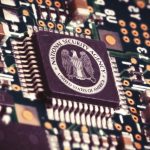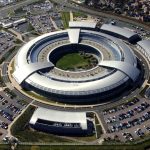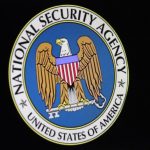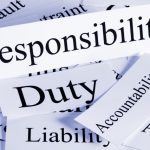ISIS has its own secure messaging system -- this illustrates the futility of communication surveillance

Moves by governments to monitor web-based communication with a view to thwarting terrorism is utterly, utterly futile. Just like the NSA's dragnet-style dredging for intelligence, mass communication surveillance does little to home in on target -- the ones that government should be concerned about are the very ones who know who to evade detection.
This is something that was perfectly demonstrated this week when it became apparent that ISIS has developed its own secure messaging system. No longer reliant on the likes of WhatsApp, ISIS is using a custom-built, Android-based encrypted messaging tool that is incredibly difficult -- if not impossible -- for the FBI and NSA to monitor.
Juniper gets rid of 'NSA-developed' security code

Juniper Networks has stated that it will no longer be using a segment of security code purported to have been developed by the National Security Agency (NSA) for the purpose of eavesdropping on clients’ VPN connections.
The code in question is based on Dual Elliptic Curve technology, and Juniper has stressed it will be replaced during the first quarter of 2016 for a version that is considerably more secure. The Silicon valley based company claims the new secure code will rely on greater numbers than those generated through the flawed Dual Elliptic Curve technology.
BlackBerry's privacy stance is yet another reason to avoid the company

We are living in a post NSA-world (and I am a post-NSA girl...) and privacy is in the public consciousness more than ever before. After the government surveillance revelations that came courtesy of Eddy Snowden, most tech companies have been trying to stress to customers and clients just how willing they are to stand up for privacy.
But not BlackBerry. Company CEO John Chen has used a blog post to lash out at his contemporaries for supporting strong encryption. He makes a thinly-veiled reference to Apple, accusing that an unwillingness to comply with law enforcement requests put us all in a "dark place". Chen says that "our privacy commitment does not extend to criminals", seemingly failing to recognize that privacy is very much an all-or-nothing concept.
Connected toys and the IoT could be the next weapons of mass surveillance

Just a few days ago, we heard about the potential for the web-enabled Hello Barbie to provide hackers with personal data. Numerous vulnerabilities open up the potential for data to be stolen, but this could be the start of a worrying trend. If you thought the surveillance activities of the NSA and GCHQ are disturbing, things could be about to get much worse.
There is a movement underway that sees every conceivable device being transformed into a connected device. This is more than just the Internet of Things -- security experts are warning that not only could any devices connected to the internet (including web-enabled toys) could be used to spy on users, placing children at risk.
GCHQ accused of "persistent" illegal computer hacking

Court documents released during a court case brought by Privacy International show that GCHQ -- the UK version of the NSA -- has engaged in "persistent" illegal hacking. The targets of the intelligence agency's surveillance include computers and phones around the world without the need for individual warrants.
There is concern about the use of "thematic warrants" which allows GCHQ to hack computers with very little justification or oversight, and with very broad remits. Privacy International is involved because there are clear privacy issues involved in GCHQ's activities, and it is seen as being of greater importance than ever with renewed interest in the Investigatory Powers Bill.
NSA stops bulk collection of phone metadata

The NSA's bulk surveillance and collection of phone data has come to an end. President Obama announced that the current surveillance program would stop by 11:59 pm EST Saturday, but this does not mean that phone surveillance has completely disappeared.
Instead of wide scale dredging of data, the NSA will now engage in more targeted surveillance programs -- something that privacy advocates have been calling for for some time. The scaling back of surveillance has not come out of the blue; it's became of a legal requirement earlier in the year that has now been implemented two and half years after Edward Snowden blew the whistle on NSA spying.
Most smartphone owners fear hackers, thieves and government control

Edward Snowden's NSA and GCHQ revelations seem to be unending. One of his more recent disclosures was that UK intelligence agencies had the ability hack and remotely control any smartphone.
A survey by Broadband Genie shows that smartphone owners are more than a little concerned about this, with more than half (55 percent) saying the possibility of remote control worries them. A similar number (53 percent) express concern that these surveillance and control powers are open to abuse, and nearly a quarter (24 percent) feel they are a breach of human rights.
We can't let governments use ISIS and Paris attacks as excuses to increase surveillance

The tragic events in France have, almost inevitably, led to renewed calls for increased surveillance of the internet. This cannot be allowed to happen; terrorism cannot be used as an excuse to infringe upon the privacy of millions of innocent internet users.
We have groups such as Anonymous taking a vigilante stance in a bid to drive ISIS from the internet, but governments have leapt on the massacres as a justification for additional snooping powers. This smacks very much of being a knee jerk reaction, and there is a very real danger that rushed legislation will cause greater harm than good.
It is your duty to use an ad blocker, says Edward Snowden

Ad blocking tools are rarely out of the news these days. In times of heightened awareness about online privacy, more and more people are turning to things like Adblock Plus to banish ads and clean up their web browsing experience. For many people an ad blocker is seen as essential.
Edward Snowden goes further. The former NSA contractor says that it is a web user's duty to protect their computer by blocking potential attack vectors such as Flash and JavaScript-riddled advertisements.
How to avoid online surveillance -- the essential guide

It would appear that mass surveillance of the Internet is here to stay. We can rage against the machine, but ultimately we're powerless to stop the likes of the NSA and GCHQ prying into whatever they want to pry into. More and more people are turning to the dark web to help cover their tracks, but even the supposedly anonymous haven of Tor can be cracked for a price.
Last week in the UK, the draft Investigatory Powers Bill was published outlining proposals for ISPs to retain user's browsing histories for a full year. Governments want to weaken encryption. The FCC ruled that Do Not Track requests are essentially meaningless. The NSA finds and takes advantage of vulnerabilities. It's little wonder that privacy groups are up in arms -- the erosion of online rights continues with terrifying speed. But all is not lost. There are still things you can do to help maintain your privacy. If you're concerned, here's what you can do.
Microsoft to hide European data from the NSA with new German datacenters

The arms of the NSA may be long, but there are some parts of the world in which it holds no sway. Conscious of European concerns about US government web surveillance, Microsoft today announces German datacenter options for Azure, Office 365 and Dynamics CRM Online.
Starting in the second half of 2016, customers in Europe will be able to opt to have their data stored in Germany. The datacenters will be controlled by German data trustee, Deutsche Telekom who will oversee all access to customer data. With Microsoft’s "mobile first, cloud-first" philosophy, this is a move to try to rebuild trust in cloud services which the company clearly feels has been lost.
The next target for surveillance: the dark web

The surveillance activities of the NSA and GCHQ are well known, and many people hoping to slip under the radar have taken to the 'dark web'. Famous for sites such as Silk Road, as well as being home to illegal content such as child pornography, the dark web may not be a safe haven for much longer.
Joint Operations Cell (JOC) is a new venture in the UK which sees the National Crime Agency (NCA) and GCHQ joining forces. Described as a "genuinely innovative development", the operation aims to home in on online criminals, with a particular focus on crimes involving child exploitation.
The NSA keeps 9 percent of the vulnerabilities it discovers to itself

Openness and the NSA are not happy bedfellows; by its very nature, the agency is highly secretive. But in recent years, post-Edward Snowden, the organization has embarked on something of a PR campaign in an attempt to win back public trust.
The latest manoeuvre sees the NSA promoting the fact that when it discovers security vulnerabilities and zero-days in software, it goes public with them in 91 percent of cases... but not before it has exploited them. No information about the timescale for disclosures is given, but what most people will be interested in is the remaining 9 percent which the agency keeps to itself.
UK government started online mass surveillance after 9/11 -- but few politicians knew

On Wednesday, the Investigatory Powers Bill was published in draft form, but it was in the wake of 9/11 that the UK government started its mass surveillance programs, spying on the online activities of British citizens. Under the guise of the 1984 Telecommunications Act, this surveillance was moved up a gear in 2005. Former deputy Prime Minister Nick Clegg says that very few politicians knew about it.
Clegg only learned of the surveillance programs that were used to harvest emails, phone records, and texts in 2010, and questioned whether it was necessary. The former PM makes the revelations in an article for the Guardian in which he says that after Edward Snowden NSA and GCHQ spying revelations, "the knee-jerk response from the government was to play the man and ignore the ball".
ISPs to be forced to store users' browsing history for a year

The UK government today published a draft version of the Investigatory Powers Bill setting out a framework for new surveillance powers. Among the proposed measures is a requirement for ISPs to keep a record of every website their customers visit for 12 months.
Fears that encryption would be banned were not realized, but privacy campaigners will be disappointed that internet connection records will be accessible by police and security services without the need for a warrant. The NSA-style data collection is indiscriminate. Data will be stored about everyone's internet usage, not just those suspected of crime, terrorism and the like.
Recent Headlines
Most Commented Stories
BetaNews, your source for breaking tech news, reviews, and in-depth reporting since 1998.
Regional iGaming Content
© 1998-2025 BetaNews, Inc. All Rights Reserved. About Us - Privacy Policy - Cookie Policy - Sitemap.